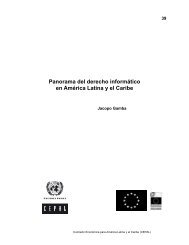Palabras en juego
Palabras en juego
Palabras en juego
You also want an ePaper? Increase the reach of your titles
YUMPU automatically turns print PDFs into web optimized ePapers that Google loves.
communication space chall<strong>en</strong>ges this premise. One of the curr<strong>en</strong>t policy debates<br />
related to the global nature of Internet concerns human rights and Internet<br />
governance, and to what ext<strong>en</strong>t the curr<strong>en</strong>t mechanisms for Internet governance<br />
have an impact on human rights. Many civil society groups argue that human right<br />
issues of privacy, freedom of expression, access to information, and the public<br />
domain of knowledge are at stake in the existing governance structures.<br />
Furthermore, there is the chall<strong>en</strong>ge of reforming the existing governing structures,<br />
since the curr<strong>en</strong>t forum for domain name managem<strong>en</strong>t is a private party<br />
dominated by a limited number of countries and based on a contract with a single<br />
governm<strong>en</strong>t. Here the human rights stance has be<strong>en</strong> that the result of the ongoing<br />
negotiations must <strong>en</strong>sure that the future mechanisms for Internet governance are<br />
human rights compliant, both in their composition and governing structures and<br />
through regular monitoring and assessm<strong>en</strong>t of their decisions. “It is a state<br />
responsibility to <strong>en</strong>sure that Internet governance mechanisms are compliant with<br />
human right standards, that there are means to <strong>en</strong>force them, and that<br />
governm<strong>en</strong>ts can be held accountable for human rights violations, including before<br />
international courts. Internet governance mechanisms can and should further<br />
human rights by <strong>en</strong>suring an <strong>en</strong>abling <strong>en</strong>vironm<strong>en</strong>t that protects and <strong>en</strong>forces<br />
human rights standards and democratic principles of inclusiv<strong>en</strong>ess, transpar<strong>en</strong>cy,<br />
checks and balances, and the rule of law”[18]. At pres<strong>en</strong>t, there seem to be a<br />
growing acceptance of Internet as a global commons, which implies effective<br />
access for all countries to participate in decisions regarding <strong>en</strong>joym<strong>en</strong>t of this<br />
common good.<br />
Another debate concerns the global CRIS (Communication Rights in the<br />
Information Society) campaign. The CRIS campaign has raised issues of<br />
knowledge ownership and media diversity within the information society ag<strong>en</strong>da,<br />
and demands the recognition of a new human right; the right to communicate. In<br />
response to this, a number of human rights groups have argued that these issues<br />
can and should be addressed within the existing human rights framework. The<br />
right to communicate should not be conceived as a new and indep<strong>en</strong>d<strong>en</strong>t right but<br />
rather as an umbrella concept; communication rights, <strong>en</strong>compassing the effective<br />
implem<strong>en</strong>tation of a group of related existing rights. [19]<br />
A continuous and final battlefield to be m<strong>en</strong>tioned is the struggle to <strong>en</strong>sure that<br />
working for and with human rights in the information society does not limit itself<br />
solely to the affirmation of already set human rights standards, but includes the<br />
effective protection and implem<strong>en</strong>tation of these rights.<br />
With regard to technical developm<strong>en</strong>ts <strong>en</strong>tailing privacy threats, these call for a<br />
tight legal and political framing, which must be built upstream through privacy<br />
impact assessm<strong>en</strong>ts, and not only once the risks have manifested themselves in<br />
our everyday life.<br />
It is urg<strong>en</strong>t that we continuously address the chall<strong>en</strong>ge of bringing people and<br />
countries closer to the standards outlined in the human rights treaties, and<br />
evaluate their realization through b<strong>en</strong>chmarks and indicators for national<br />
<strong>en</strong>forcem<strong>en</strong>t and compliance. So far the WSIS process has shown little political<br />
willingness to address this chall<strong>en</strong>ge.



